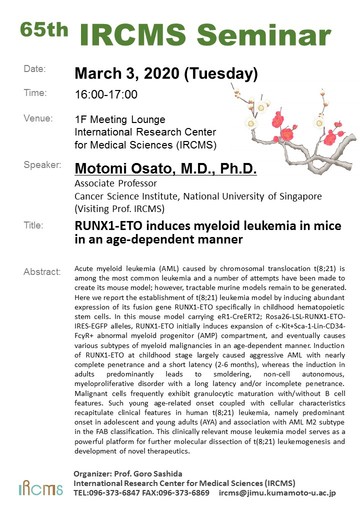Events
Cancelled [Mar 3] 65th IRCMS seminar
February 19 2020
This seminar was cancelled due to COVID.
We would like to inform you that the 65th IRCMS Seminar has been scheduled as below.
We would be pleased to see many of you participating in the seminar.
Date : March 3 (Tuesday)
Time : 16:00-17:00
Venue : IRCMS 1F Meeting Lounge
Speaker : Motomi Osato, M.D., Ph.D.
Associate Professor
Cancer Science Institute of Singapore, National University of Singapore,
(Visiting Professor, IRCMS)
Tilte : RUNX1-ETO induces myeloid leukemia in mice in an age-dependent manner
Abstract:
Acute myeloid leukemia (AML) caused by chromosomal translocation t(8;21) is among the most common leukemia and a number of attempts have been made to create its mouse model; however, tractable murine models remain to be generated. Here we report the establishment of t(8;21) leukemia model by inducing abundant expression of its fusion gene RUNX1-ETO specifically in childhood hematopoietic stem cells. In this mouse model carrying eR1-CreERT2; Rosa26-LSL-RUNX1-ETO-IRES-EGFP alleles, RUNX1-ETO initially induces expansion of c-Kit+Sca-1-Lin-CD34-FcγR+ abnormal myeloid progenitor (AMP) compartment, and eventually causes various subtypes of myeloid malignancies in an age-dependent manner. Induction of RUNX1-ETO at childhood stage largely caused aggressive AML with nearly complete penetrance and a short latency (2-6 months), whereas the induction in adults predominantly leads to smoldering, non-cell autonomous, myeloproliferative disorder with a long latency and/or incomplete penetrance. Malignant cells frequently exhibit granulocytic maturation with/without B cell features. Such young age-related onset coupled with cellular characteristics recapitulate clinical features in human t(8;21) leukemia, namely predominant onset in adolescent and young adults (AYA) and association with AML M2 subtype in the FAB classification. This clinically relevant mouse leukemia model serves as a powerful platform for further molecular dissection of t(8;21) leukemogenesis and development of novel therapeutics.

